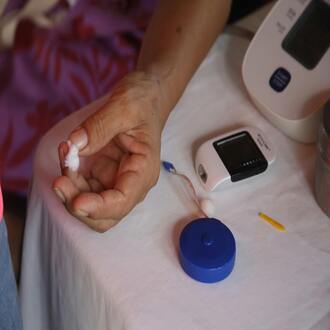Transcription Nutritional assessment
Older age is a stage of life in which attention to health and nutrition takes on significant importance. As we age, our bodies undergo physical, physiological and metabolic changes that require special attention in terms of food and nutrition.
In this session, we will explore nutritional assessment in the elderly and key objectives to ensure the health and well-being of older adults.
Introduction to nutritional assessment in the elderly
Nutritional assessment is a fundamental process for evaluating a person's nutrient intake, health status and dietary needs. In the elderly, this assessment becomes an essential tool to maintain a good quality of life and prevent nutrition-related health problems.
Objectives of nutritional assessment in the elderly
Determine nutritional status: The first objective of the nutritional assessment is to evaluate the current nutritional status of the elderly person. This involves measuring weight, height, body mass index (BMI) and analyzing body composition. These data provide information on the amount of fat and muscle mass, which is crucial for understanding metabolic health and the risk of diseases such as obesity or sarcopenia.
Assess dietary intake: It is important to analyze the older person's dietary intake to identify possible nutrient deficiencies or excesses. Food records and questionnaires can be used to assess eating patterns and determine if recommended nutritional needs are being met.
Identify nutritional deficiencies: One of the most critical goals of nutritional assessment in the elderly is to identify specific nutritional deficiencies. Deficiencies of nutrients such as vitamin D, vitamin B12, calcium and iron are common in this stage of life and can have serious health consequences.
Assess gastrointestinal health: Gastrointestinal function can be impaired in the elderly, which can influence nutrient absorption. Assessing the health of the gastrointestinal tract is essential to address problems such as nutrient malabsorption or food intolerance.
Assess chewing and swallowing problems: Chewing and swallowing ability may decrease with age due to dental or muscular problems. This can make it difficult to eat solid foods and increase the risk of malnutrition. The nutritional assessment should include an evaluation of the ability to chew and swallow food.
Detect appetite and satiety problems: In the elderly, problems related to appetite and satiety may arise. The nutritional assessment should include questions about changes in appetite, preference for certain foods, and ability to experience satiety after meals.
Assess hydration: Dehydration is a significant risk in the elderly. Nutritional assessment should include evaluation of fluid intake and signs of dehydration, such as dry mouth or decreased urination.
Benefits of nutritional assessment in the elderly
Nutritional assessment in the elderly offers several benefits, including:
- Early identification of nutritional problems.
- Design of individualized dietary plans.
- Prevention and management of nutrition-related diseases.
- Improvement of quality of life and well-being.
- Promotion of independence and autonomy.
nutritional assessment




